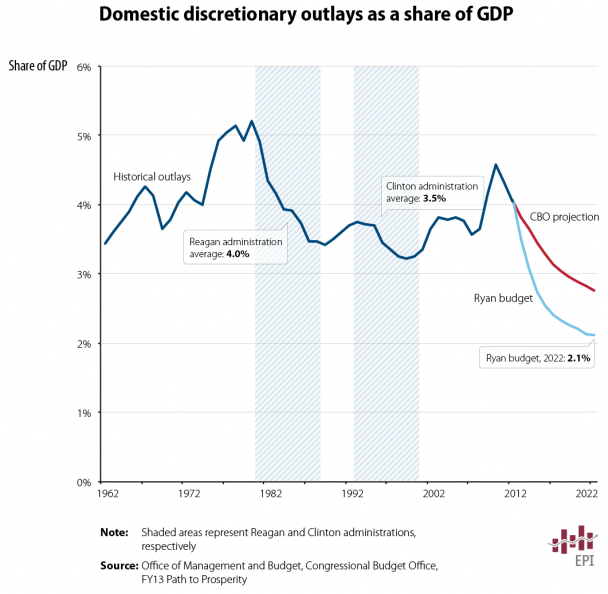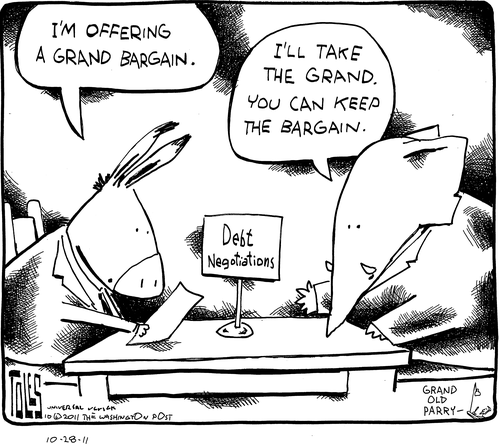Cross posted from The Stars Hollow Gazette
In April of 2011, Rollingstone‘s contributing editor Matt Taibbi wrote a piece about Paul Ryan and budget proposal titled, Tax Cuts for the Rich on the Backs of the Middle Class; or, Paul Ryan has Balls
I heartily laughed at Matt’s description of Paul Ryan:
Paul Ryan, the Republican Party’s latest entrant in the seemingly endless series of young, prickish, over-coiffed, anal-retentive deficit Robespierres they’ve sent to the political center stage in the last decade or so, has come out with his new budget plan. All of these smug little jerks look alike to me – from Ralph Reed to Eric Cantor to Jeb Hensarling to Rand Paul and now to Ryan, they all look like overgrown kids who got nipple-twisted in the halls in high school, worked as Applebee’s shift managers in college, and are now taking revenge on the world as grownups by defunding hospice care and student loans and Sesame Street. They all look like they sleep with their ties on, and keep their feet in dress socks when doing their bi-monthly duty with their wives.
You have to admit that is scathingly accurate.
I thought of my own Tea Party House “Rat”, Michael Grimm. Grimm a former FBI agent and freshman representative from New York’s newly redrawn 11th who is currently the target of a federal grand jury investigation into the fundraising for his 2010 campaign. He fits Matt’s description to a tee.
Although Grimm is not a member of the Tea Party Caucus, he has voted lock step with them. When Grimm voted for Ryan’s first budget plan which called for a fix voucher and cuts to Medicaid that that would hurt the poor and elderly, Staten Island Tea Partiers were vocally upset with him. But I can almost guarantee they will give him a second chance to screw them, and everyone else, come November.
Back to Matt’s article. With his wry wit, he goes on to describe Ryan’s goal to reduce taxes for the wealthiest by asking seniors to cut back on their health care in order to pay for those tax breaks. That takes balls.
Never mind that each time the Republicans actually come into power, federal deficit spending explodes and these whippersnappers somehow never get around to touching Social Security, Medicare or Medicaid. The key is that for the many years before that moment of truth, before these buffoons actually get a chance to put their money where their lipless little mouths are, they will stomp their feet and scream about how entitlements are bringing us to the edge of apocalypse.
The problem, of course, is that to actually make significant cuts in what is left of the “welfare state,” one has to cut Medicare and Medicaid, programs overwhelmingly patronized by white people, and particularly white seniors. So when the time comes to actually pull the trigger on the proposed reductions, the whippersnappers are quietly removed from the stage and life goes on as usual, i.e. with massive deficit spending on defense, upper-class tax cuts, bailouts, corporate subsidies, and big handouts to Pharma and the insurance industries.
This is a political game that gets played out in the media over and over again, and everyone in Washington knows how it works. Which is why it’s nauseating (but not surprising) to see so many commentators falling over themselves with praise for Ryan’s “bold” budget proposal, which is supposedly a ballsy piece of politics because it proposes backdoor cuts in Medicare and Medicaid by redounding their appropriations to the states and to block grants. Ryan is being praised for thusly taking on seniors, a traditionally untouchable political demographic .
Medicaid cuts that would deeply effect the elderly are never discussed by the media, even now with Ryan the presumptive Republican vice presidential nominee:
While the Republican vice-presidential candidate is careful to avoid touching Medicare benefits for anyone at or near retirement, his budget would impose immediate cuts to Medicaid, the health-care program for the poor that funds nursing-home care and other benefits for 6 million U.S. seniors. [..]
The proposed Medicaid changes are often overlooked amid the debate over Ryan’s Medicare plan, which has taken center stage in the presidential contest since the Wisconsin congressman was chosen as Mitt Romney’s running mate on Aug. 11. It’s politically important because those 65 and older are a crucial voting bloc. [..]
Health-care policy specialists say it’s politically easier to cut Medicaid because most voters don’t understand it. [..]
Many middle-income Americans who may be unfamiliar with Medicaid end up relying on the program in their old age because they exhaust their assets. Medicare doesn’t cover long-term care so they turn to Medicaid, which does. [..].
Without Medicaid, current and future Medicare recipients would be in deep financial trouble, as would nursing homes and hospitals that would be under obligation to treat them even if they lack coverage. Ryan’s budget would do this just to give the top 2% another tax cut that wouldn’t even be covered by the cuts.
In his last paragraph, Matt say this about Ryan and his budget:
The absurd thing is that Ryan’s act isn’t even politically courageous. It’s canny calculation, but courage it is not. It would be courageous if Ryan were, say, the president of the United States, and leaning on that budget with his full might. But Ryan is proposing a budget he knows would have no chance of passing in the Senate. He is simply playing out a part, a non-candidate for the presidency pushing a rhetorical flank for an out-of-power party leading into a presidential campaign year. If the budget is a hit with the public, the 2012 Republican candidate can run on it. If it isn’t, the Republican candidate can triangulate Ryan’s ass back into the obscurity from whence it came, and be done with him.
All Paul Ryan has are his “balls” because he certainly doesn’t have a heart or a conscience.
So much for obscurity. Little did Matt know.


 The deadline for the bicameral Super Committee to come up with a deal on deficit reduction is a week away. While many
The deadline for the bicameral Super Committee to come up with a deal on deficit reduction is a week away. While many